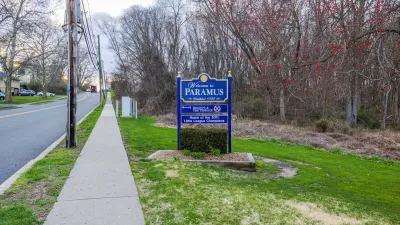A new book further reveals the inequities perpetuated by restrictive zoning policies.

A new book by Richard D. Kahlenberg, Excluded: How Snob Zoning, NIMBYism, and Class Bias Build the Walls We Don’t See, highlights the social and economic effects of exclusionary zoning.
Joan Mooney outlines the book’s main points in Smart Cities Dive, writing that “The book lays out the problem starkly: In most U.S. cities, zoning laws bar multifamily units on three-quarters of the land. Minimum lot sizes for single-family homes can drive up prices even further.”
Kahlenberg points out the racially restrictive housing covenants that kept many families of color out of certain neighborhoods prior to the passage of the Fair Housing Act of 1968. After that law made such explicitly racist covenants illegal, “other restrictive housing covenants replaced them and later were codified by zoning laws. Those zoning laws mean that today, suburbs are more likely to be racially integrated but are still segregated by class.”
The book reminds readers that “Exclusionary zoning policies are not immutable,” and that many cities and states are eliminating or reforming single-family zoning. In the spirit of the Fair Housing Act, Kahlenberg suggests an “Economic Fair Housing Act” that would outlaw income discrimination in housing.
FULL STORY: How ‘snob zoning’ blocks opportunity

Alabama: Trump Terminates Settlements for Black Communities Harmed By Raw Sewage
Trump deemed the landmark civil rights agreement “illegal DEI and environmental justice policy.”

Planetizen Federal Action Tracker
A weekly monitor of how Trump’s orders and actions are impacting planners and planning in America.

The 120 Year Old Tiny Home Villages That Sheltered San Francisco’s Earthquake Refugees
More than a century ago, San Francisco mobilized to house thousands of residents displaced by the 1906 earthquake. Could their strategy offer a model for the present?

In Both Crashes and Crime, Public Transportation is Far Safer than Driving
Contrary to popular assumptions, public transportation has far lower crash and crime rates than automobile travel. For safer communities, improve and encourage transit travel.

Report: Zoning Reforms Should Complement Nashville’s Ambitious Transit Plan
Without reform, restrictive zoning codes will limit the impact of the city’s planned transit expansion and could exclude some of the residents who depend on transit the most.

Judge Orders Release of Frozen IRA, IIJA Funding
The decision is a victory for environmental groups who charged that freezing funds for critical infrastructure and disaster response programs caused “real and irreparable harm” to communities.
Urban Design for Planners 1: Software Tools
This six-course series explores essential urban design concepts using open source software and equips planners with the tools they need to participate fully in the urban design process.
Planning for Universal Design
Learn the tools for implementing Universal Design in planning regulations.
Clanton & Associates, Inc.
Jessamine County Fiscal Court
Institute for Housing and Urban Development Studies (IHS)
City of Grandview
Harvard GSD Executive Education
Toledo-Lucas County Plan Commissions
Salt Lake City
NYU Wagner Graduate School of Public Service





























